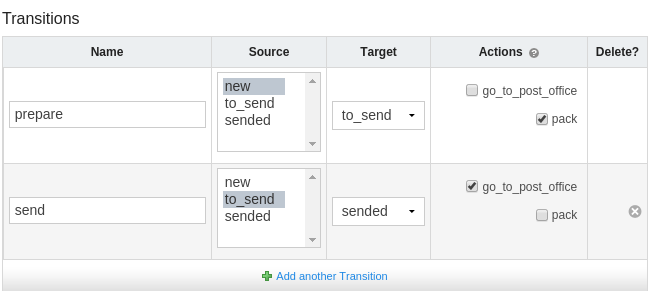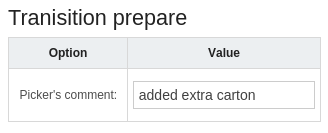Transitions¶
The transition change state (e.g. status) of object from one to another - that helps in product lifecycle management. For each object (asset, support, licence) you can define some workflow (set of transitions) and provide special actions for each transition.
Custom template for transition¶
For each transition you can separately specify Django's template in the transition's form, to do this add new item to TRANSITION_TEMPLATES in your settings file. For instance:
TRANSITION_TEMPLATES = [
('my_templates/transitions/blue.html', 'Blue version'),
('my_templates/transitions/red.html', 'Red version'),
]
Defining action¶
You can easliy add new action by add method to your class and decorating with @transition_action. For exmple:
class Order(models.Model, metaclass=TransitionWorkflowBase):
status = TransitionField(
default=OrderStatus.new.id,
choices=OrderStatus(),
)
@classmethod
@transition_action
def pack(cls, instances, request, **kwargs):
notify_buyer('We pack your order for you.')
@classmethod
@transition_action
def go_to_post_office(cls, instances, request, **kwargs):
notify_buyer('We send your order to you.')
Now actions are available in admin panel when you can specify your workflow.

Extra parameters¶
If your action required extra parameters to execute you can add fields:
from django import forms
ALLOW_COMMENT = True
...
@classmethod
@transition_action(
form_fields = {
'comment': {
'field': forms.CharField(),
'condition': lambda obj: (obj.status > 2) and ALLOW_COMMENT
}
}
)
def pack(cls, instances, request, **kwargs):
notify_buyer(
'We pack your order for you.',
pickers_comment=kwargs['comment'],
)

Allowed params for field::
field - standard form field, e.g. from django.forms,
condition - function wich accept one parameter and return boolean, when condition have be met the field will be shown.
Set only_one_action to True if the transition is to be only one action requirements.
Set return_attachment to True if action return attachment (e.g.: PDF document).
Storing additional data in transition history¶
If you want to add additional information to the transition history, you need to add to the dictionary history_kwargs in your action:
def unassign_user(cls, instances, request, **kwargs):
for instance in instances:
kwargs['history_kwargs'][instance.pk][
'affected_user'
] = str(instance.user)
instance.user = None
Share data between actions¶
You could also share additional data between consecutive actions using shared_params in the same way as history_kwargs.
Rescheduling actions¶
Asynchronous transition (action) is capable to reschedule it later (ex. when waiting for certain condition to be satisfied, instead of active waiting). To do this, just raise ralph.lib.transitions.exceptions.RescheduleAsyncTransitionActionLater exception in your action.
Both
history_kwargsandshared_paramsare properly handled (and restored) when action is rescheduled later.